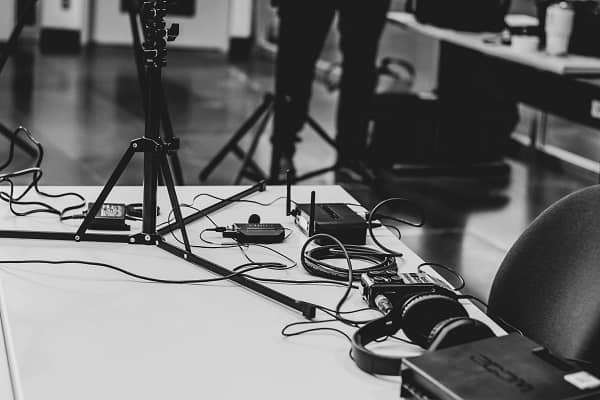Playing your first live gig on guitar can be an exhilarating yet nerve-wracking experience. We all hope for a smooth show where everything goes as planned. However, problems inevitably occur no matter how prepared you think you are.
The key is to anticipate potential issues and have backup plans in place. The people who succeed most at their debut gig are not necessarily the best guitar players; rather, they are the ones with the mindset and adaptability to problem-solve when things go wrong.
You should read this article because it provides crucial tips for preparing both logistically and mentally so you can put on an amazing first gig.
Tips and Tricks for Your First Gig
Here discover some beginner guitar lessons and tips on how to prepare for your debut gig.
Rehearse
This cannot be stressed enough as it is the ultimate advice for a smooth gig and successful show. If you think you have practiced enough, do it more! Play everything inside and out, and memorize songs even if you plan on using music.
Play sitting down, standing up, and even walking around. Get used to playing in weird positions to challenge your muscle memory of the song.
Practice with distractions so you are ready for a stage and all of its noise. Play the music you will be using so much that it becomes second nature, your hands should know it as well as the brain!
Also, make sure to record your guitar lessons and practice sessions so you can find any mistakes that listeners may notice.
Find the Right Show
Make sure you have set up your contacts and contracts correctly so the show will go smoothly. If someone is extra flaky, be certain the show will go on. There is nothing worse than putting the work into a gig that may not occur.
Avoid the hustlers and con artists that want to use your talent as they will never lead to good shows or upward mobility in the music world.
One way to avoid problematic people is to value your time and not be desperate. You can’t charge a fortune but you can also get paid something for your time, the right venues will want to provide reasonable pay if you are good.
If you get red flag vibes from different concerts or open mic occasions it is best to avoid them.
Make a Demo
It can be very helpful to make a simple demo recording of your songs to share with the venue ahead of time. This allows them to get familiar with your music and make sure the sound system is properly calibrated.
It also shows that you are taking preparation seriously. The recording doesn’t need to be perfect, just clean enough to accurately represent your sound. Spend an afternoon recording your setlist on your phone or computer.
Practice Band Introduction
Take some time to practice introducing your band in a confident, engaging way. Write out a short script ahead of time highlighting band members and maybe sharing an interesting detail about your music.
Practice speaking clearly and fluidly. A professional, charismatic introduction goes a long way toward winning over the audience right from the start.
Make a Checklist
Having a master checklist for everything you need to bring and prepare is essential so nothing gets left out. Make a list including gear, backup items, promotional material, setlist, names and contacts, soundcheck schedule, directions, and any other details.
Review and check off items as you load and pack to keep organized.
Expect the Worst
Do you have a fear or worry, that’s fine as you will want to embrace it. What happens if a song you are playing doesn’t work? In that case, be prepared to play a backup tune.
What happens if people boo or don’t like it? Well, it might happen so be ready for that. Practice banter and humor that may be usable between takes. If the audience knows you are upset they will feed off it, otherwise a carefree approach will rub off on them.
If you can imagine a bad scenario at the gig then do so, but don’t just ruminate on what may happen. Get ready on how to deal with it, you can’t know your reaction to all problems but you can prepare and practice.
Soundcheck and Tech Prep

If you have a sound person then be the nicest you can be to them as they will be controlling major parts of your show. But if not you will have to be ready with all the technical aspects.
Just as you need to practice guitar you also need to know how to use a mixing board and any software on a tablet or computer. If you do not have technical abilities then your show shouldn’t be too dependent upon that.
Since problems will arise it is wise to know exactly what you are doing, don’t leave it for showtime to acknowledge that you may be out of your depth. Always rely more on talent and showmanship as opposed to tech frills, that way if they fail you can still give a good performance.
Any instrument or vocal you plan to use needs to be run through the soundboard so it will be ready, don’t mess with amps right before you go on, and have your hardware pedals all setup.
Have Spare Everything!
Spare strings, cleaning cloth, picks, and maybe even a spare guitar, especially if it is a big show! If this show may make or break your career then it is important to carry extras for every aspect.
It is also very important to carry any gear or guitars in proper hard cases, anything too soft will get dented and damaged. You need to be focused on giving a great performance and not worried about getting broken equipment.
Visit the Venue Ahead of Time
Get to know the performance space beforehand so you are familiar on the night of the gig.
If possible, stop by a few days ahead to see the size of the stage and audience area, meet the staff, and understand the overall layout. Knowing what to expect removes uncertainty so you can focus on the music.
Arrive Early and Don’t Drink
If visiting the venue ahead of time is not possible, ensure that you arrive at the venue on time. This will allow you to prepare and set up for your show. Try not to be a pain or overly needy but also remember to ask for help to avoid embarrassment.
Most musicians are nice and willing to help you with anything if you return the kindness. Avoid drinking, drugs, and chemicals beforehand as it never helps your playing or singing. In fact, being intoxicated is a surefire way to not make friends and mess your show up.
Watch How You Carry Yourself
Keep an eye on your appearance as far as how you dress, look, and react to everything. If we lived in a perfect world this wouldn’t matter but it can be more important than how you play.
Some guitar players are not that great at playing but their charisma and looks sure carried them far! It does matter how you present yourself for a successful gig.
Also when you make a mistake just keep going, your confidence will determine your ability to do well. If you are bold and fun in your playing style, singing, and overall performance you will get a much stronger reaction from the audience.
Otherwise, how would such bad singers and guitarists sometimes get so famous? (It’s funny and true!)
Be Ready to Pander
Don’t practice and focus on music that you like, learn things that the audience loves! Simple 3 and 4-chord songs that everyone likes are great backup songs to know when you get in a bind at a gig.
If your original song or genre you are playing isn’t going well you can salvage the show by playing what most people like. One reason cover bands that play the same old songs are so successful is because people love that.
If you want to be financially motivated by your guitar gigs it is best to play whatever the audience wants!
Practice!!!!
Was this one already mentioned, of course, but do it more! To save yourself from embarrassment, just keep playing what will be at the show. Pretend you are live at the show now and run through all the scenarios in your head.
Plan for hecklers, cheerleaders, tech fails, improvised sections, and anything else that may happen. When the time finally comes the live show won’t be the same, but all the preparation will keep you on your toes!
Practice will always be the best way to prepare for your first live guitar gig. Just be sure you don’t pick pieces that are too hard to play, and that the audience will like your setlist.
Be ready with backup songs and gear, arrive early for soundcheck prep, and most of all enjoy yourself and be confident. No gig or show ever goes perfectly, but if you are prepared you will be ready for any drama or failures that come your way!
About the Author
Throughout Gary's career, from School of Rock, to Public School Modern Band Teacher, to Director of Curriculum at Little Kids Rock, there has been one single mission - to empower students to discover, play, and create music on their own terms. His role is simply to be the best guide he can be.


